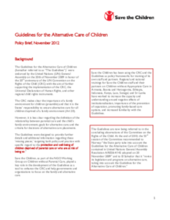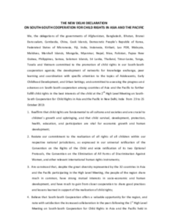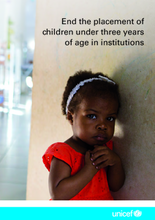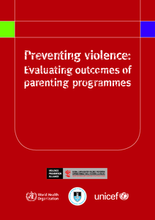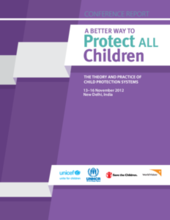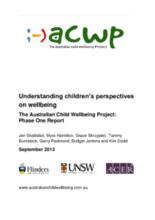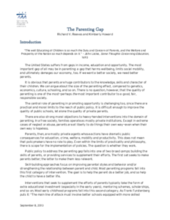Displaying 371 - 380 of 496
This policy brief by Save the Children introduces the background, goals, and guiding principles of the Guidelines for the Alternative Care of Children endorsed by the UN General Assembly on the 20th of November 2009 while also explaining why family-based care is a preferred care arrangement over institutions. Furthermore, it suggests policy and practice recommendations to further protect children without appropriate care and strengthen families and communities.
This 6-minute video from the Center on the Developing Child at Harvard University explains the importance of human interaction with a caregiver to an infant’s brain development and the dangers of neglect to a child’s cognitive development, particularly the neglect that occurs in institutional settings.
A New Delhi Declaration renewing governments' commitments to the rights of children and pledging to support each other in the achievement of those rights, was adopted unanimously on 25th October 2013 by 32 Asian and Pacific States attending the Second High Level Meeting on South-South Cooperation for Child Rights in Asia and the Pacific.
On the 22nd October 2013, a new regional campaign in the Latin American and Caribbean region was launched to end the placement of children under three years of age in institutions.
In this video, Philip A. Fisher, a senior fellow at the Center on the Developing Child at Harvard University presents at NBC News’ 2013 Education Nation Summit, explaining why positive, reciprocal interactions between caregivers and children can have enormous positive effects on children’s development and lay the groundwork for a prosperous future.
This report seeks to increase understanding of the need for, and the process of, conducting outcome evaluations of parenting programmes in low- and middle-income countries. The guidance is aimed at policy-makers; programme planners and developers; high-level practitioners in government ministries; representatives of nongovernmental and community-based organizations; and donors working in the area of violence prevention.
Presenting both a theoretical foundation and proven strategies for helping caregivers become more attuned and responsive to their young children's emotional needs (ages 0-5), this is the first comprehensive presentation of the Circle of Security (COS) intervention.
This report of a major conference held in New Delhi in November 2012 entitled “A Better Way to Protect ALL Children: The Theory and Practice of Child Protection Systems”, encapsulates the substantive content of the presentations and related discussion; provides an analysis and documents the journey; and suggest an agenda, or at least direction, for future work on Child Protection systems.
This document reports on Phase One of the Australian Child Wellbeing Project, a child-centred study in which young people’s perspectives are being used to design a major nationally representative survey of wellbeing among 8-14 year olds, and to interpret findings from that survey. It uses focus groups and in-depth interviews with young people in six groups who are often seen as experiencing high levels of marginalisation or as having particular experiences and needs, including young people living in out of home care and young people living with disability.
This paper by the Brookings Center on Children and Families examines the scope of parenting interventions in the US that directly address poor parenting, as research has found how much parenting matters.

